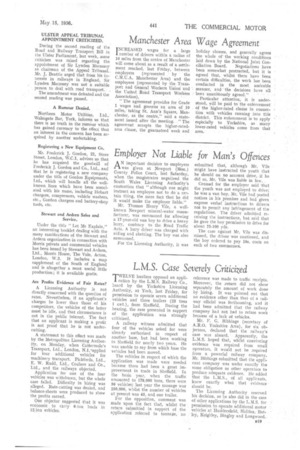L.M.S. Case Severely Criticized T 'TWELVE hauliers opposed an application by
Page 37

If you've noticed an error in this article please click here to report it so we can fix it.
the L.M.S. Railway Co., heard by the Yorkshire Licensing Authority, at York, last Friday, for permission to operate seven additional vehicles and three trailers (23 tons 1 cwt.), from Sheffield. During the hearing, the case presented in support of the application was strongly criticized.
A railway witness admitted that four of the vehicles asked for were already authorized in respect of another base, but had been working in Sheffield for nearly two years. He was unable to say from which base the vehicles had been moved.
The vehicles in respect of which the application was made were needed because there had been a great improvement in trade in Sheffield. In the basic year, when the traffic amounted to 178,000 tons, there were 96 vehicles; last year the tonnage was 250,000, whilst the number of vehicles at present was 43, and one trailer.
For the opposition, comment was made upon the fact that, whilst the return submitted in support of the application referred to tonnage, no reference was made to traffic receipts.
Moreover, the return did not show separately the amount of work done by hiring. It was pointed out that no evidence other than that of a railway official was forthcoming, and it had been admitted that the railway company had not had to refuse work because of a lack of vehicles.
Mr. F. G. Ribbings (secretary of A.R.O. Yorkshire Area), for six ob jectors, declared that the railway's case was absurd. Apparently, the L.M.S. hoped that, whilst convincing evidence was required from small operators, it would not be required from a powerful railway company.
Mr. I3ibbings submitted that the appli cant company was under exactly the same obligation as other operators to produce adequate evidence. He added that the L.M.S., of all applicants, knew exactly what that evidence should be.
The Licensing Authority reserved his decision, as he also did in the case of other applications by the L.M.S. for permission to operate additional motor vehicles at Huddersfield, Halifax, Bat' ley, Keighley, Bingley and Longwood.




































































































